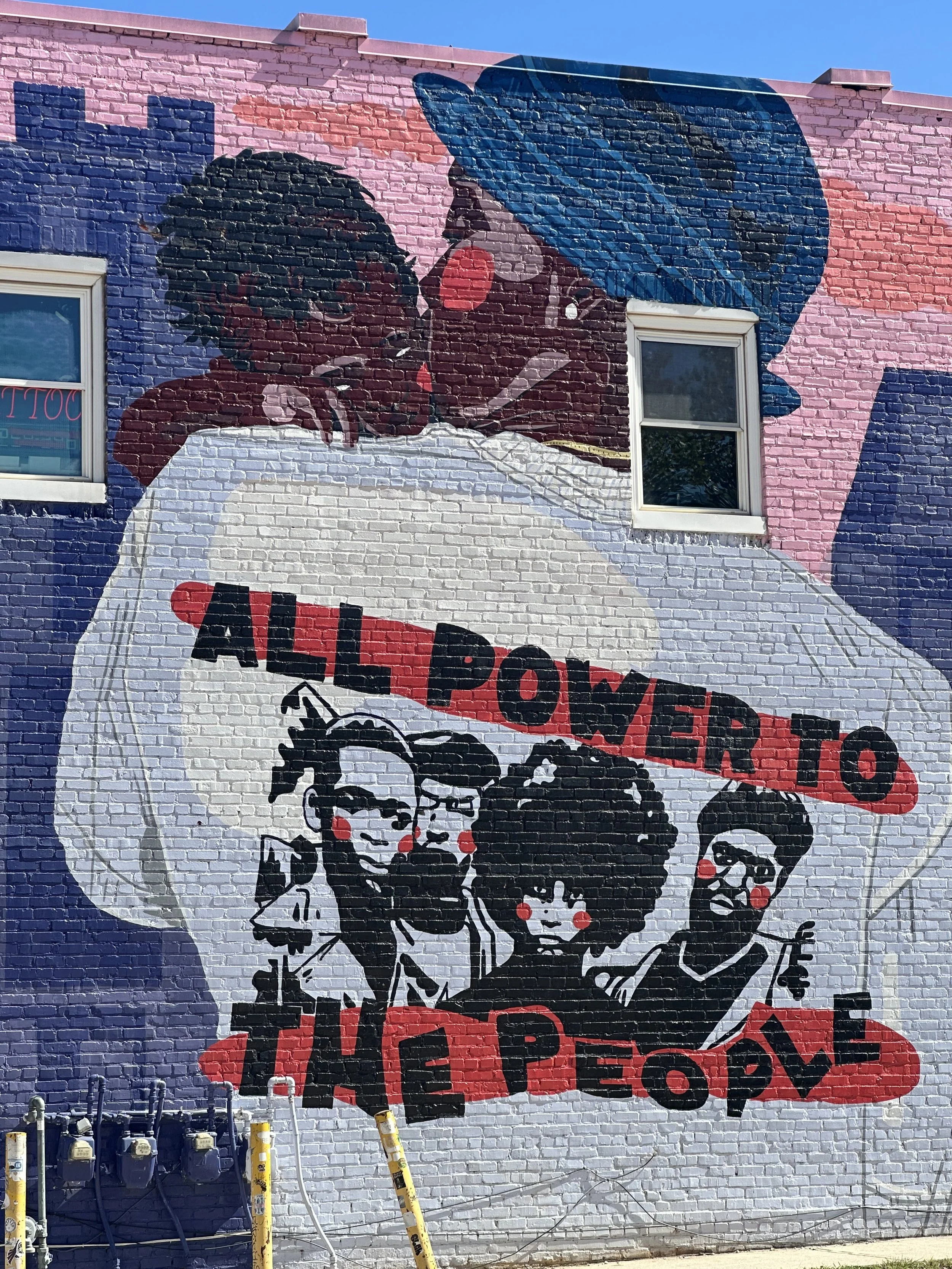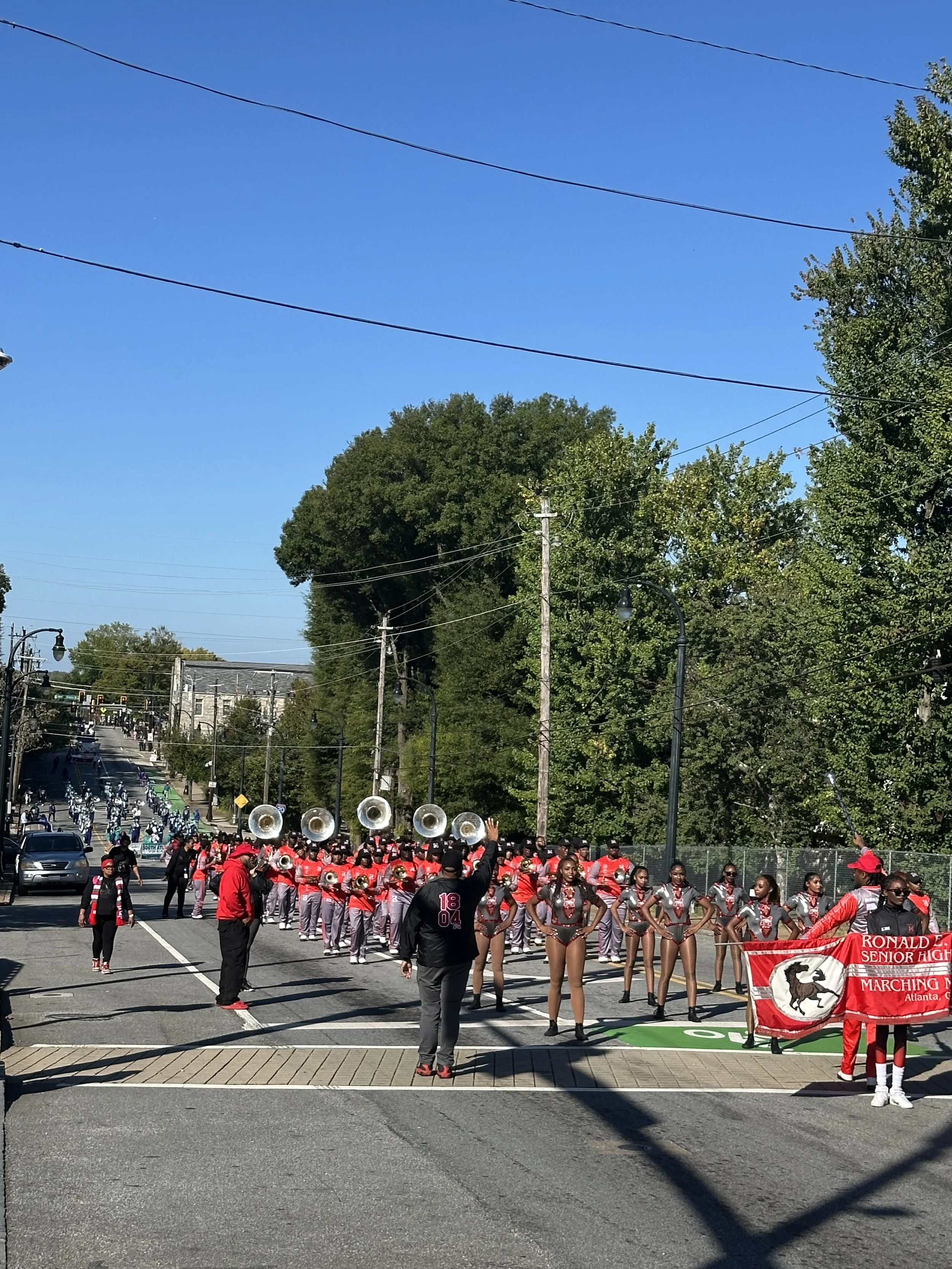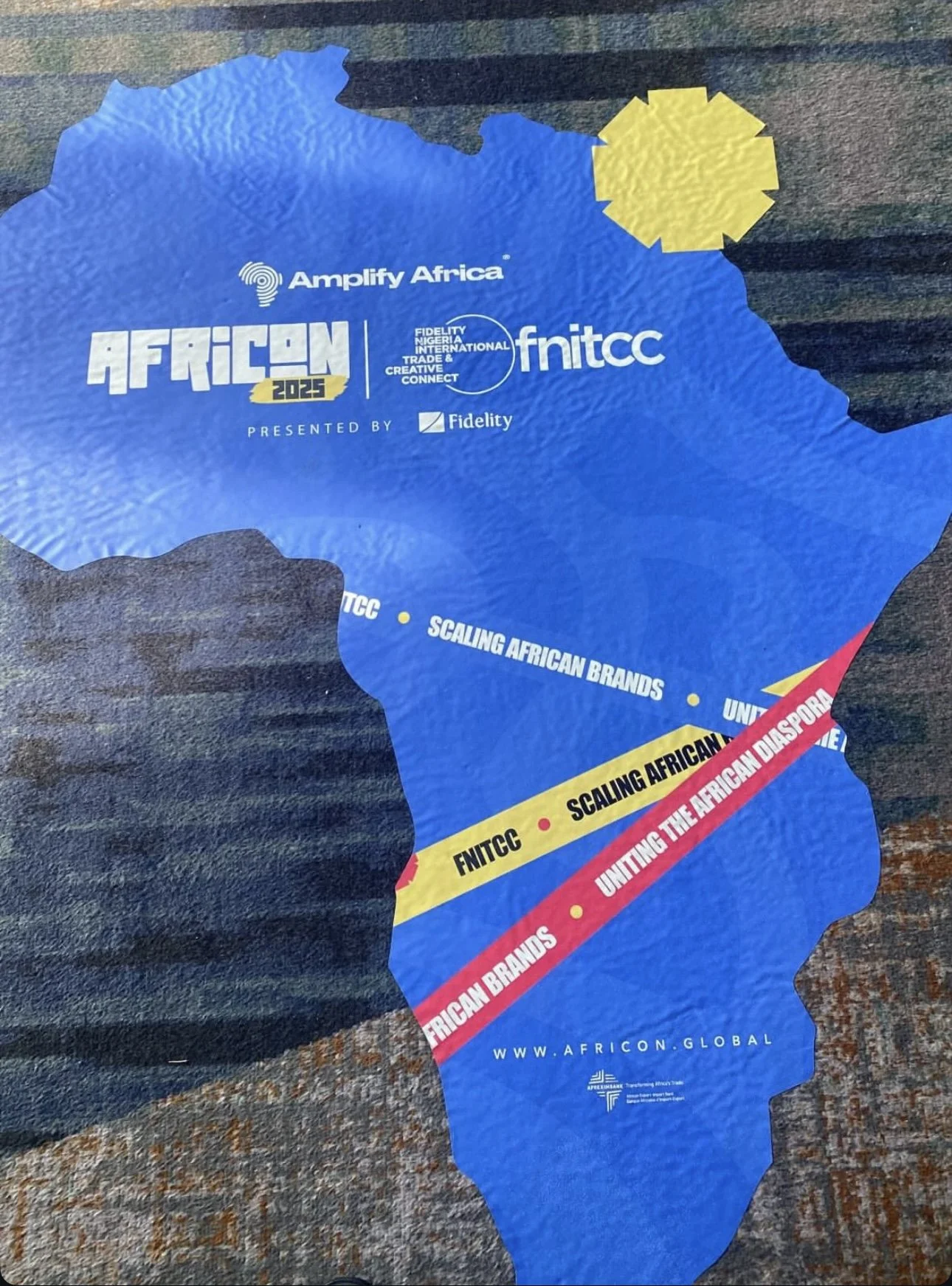ForbesBLK 2025 Summit + Atlanta Overview By Norman Busigu
Note: the first half of this piece is my overview of Atlanta, and the second half (beginning at the subheading “Preparing For The Automated World of Tomorrow, Today”) is my overview of the ForbesBLK Summit.
How Did I End Up in the “Hollywood of the South”?
A series of unplanned yet interlinked events throughout 2025 led me to Atlanta this October for the first time. Having met a proud Black-American ATLien (as many call themselves) at the Cannes Lions Festival in June, she spent months following our time in the French riviera convincing me to visit her city “The A”, and even offered to host me (which she indeed did do – a prime example of Southern Hospitality being alive and well) – promising that my time in the “Black Mecca” would open my mind to a whole new world of life possibilities – particularly as a black man. At first, I genuinely thought her extremely positive perspective on what Atlanta could do for me had to be a scam of sorts, and even joked with her on one occasion that she must be getting paid by the state of Georgia to advocate so strongly for it to out-of-towners like myself(!). But in all seriousness, she made a compelling case as to why Black American southern culture was something that I needed to experience, and how it could significantly propel the progress of my professional and personal ambitions.
Norman Busigu at Centennial Olympic Park
Around this time simultaneously, I was also invited to attend the ForbesBLK Summit at Morehouse College, representing Postcards From The Diaspora, and in collaboration with British Airways. This invitation was the final piece of the puzzle I needed that prompted me to make that leap of faith to visit the deep south and trust in the words of someone I barely knew. In hindsight, I’m glad I did: little did I realise that this trip would unlock a deeper universal understanding of the principles underpinning perseverance and wealth, and consolidate my awareness of the depth and complexities of black American culture and history – and why the south geographically plays an important role in this context. It is a city that holds a special place in my heart, and one which I would highly recommend you visit.
The City Too Busy To Hate
Known locally as the City in the Trees, one of the very first things that struck me about Atlanta was how rich the air quality is, and also how markedly green its skyline it is – something I found to be rather unusual for a major metropolis city (and it being one of the largest and most populous cities in the US). I quickly came to find out that its extensive tree coverage is higher than most American cities – a positive for helping its inhabitants keep their mental and physical health in check. No thick overcoat of smog and pollution like Central London, which was very welcomed(!).
Norman Busigu at the Belt Line
When my mind had time to wonder and take in the surroundings, I found the aesthetics and landscape of the city somewhat akin to that of Lagos (Nigeria), which is ironic given that Atlanta has one of the largest Nigerian diaspora populations in the US. But this transatlantic relationship between Lagos and Atlanta filters through in the hustle culture, entertainment and vibrancy of the city, with some Nigerians I spoke to on the ground describing at Atlanta as a home away from home. Indeed, the overlaps are very evident.
Despite being a bustling city endlessly buzzing with ideas, energy and charisma, there is a calm and tranquillity nestled in the spirit of the city that somehow transcends the noise and fast paced living. This lends itself to many open spaces and parks being easily accessible, including the Belt Line and Centennial Olympic Park (both of which I visited) that offer spaces of solace and almost spiritual solitude within a sea of activity and constant movement. Staying in a snazzy apartment in Buckhead with my super host meant that I enjoyed panoramic views of the city, and being within walking distance of Lenox Mall meant that from day one I was in the heart of the city. I bring all this up, because these elements together create a certain familiarity within the city – almost as if I had been there before, and when you sprinkle in the abundance of southern hospitality and overt black pride/culture on display, it has a charm and warmth that lulls you into a sense of comfort and belonging very quickly. Something which I have seldom experienced elsewhere.
Going deeper, ATL serves as the economic, cultural, and transportation hub for the Southeast, and historically was at the epicentre of Black American economic empowerment – with the Hartsfield-Jackson Atlanta International airport now being the busiest airport in the world, being a testament to this. It is a very unique city from the lens of opportunity, visibility and representation: it is a city home to a thriving black middle class, class of homeowners, and working professionals who have permeated almost all levels of society - Andre Dickens being mayor being an example of this.
In many ways, being in Atlanta didn’t feel dissimilar to being somewhere in sub–Saharan Africa, as I (a black man) felt as if I was in the majority, and to that extent I felt both seen and safe. Murals depicting black power and history are all over the city, and there is no shortage of the culture being able to experience – from going to Ebenezer Baptist Church (where Martin Luther King Jr was baptised), to the MLK memorial site, to experiencing Morris Brown’s Homecoming, to vibing out to Orchestral Noir’s incredible live renditions, and visiting the Apex Museum... and getting a Breeze card meant that I could glide through the city with ease. This is a city rich and deep in the cultural history of the black American journey toward socio-political and economic empowerment and is a must for anyone worldwide that holds even a slither of interest in these topics and themes. The soul of this city and the spirit of black America is firmly seated in Atlanta.
Morris Brown Homecoming Parade (2025)
It is also a city which embraces youth culture, with too much to do at any given moment. I had time to go one of the most fun brunches I’ve ever been to, the Interlock, and Insomnia (night club), just to give a few examples… and from what I understand, even amidst the worldwide lockdowns that occurred during the COVID 19 pandemic, Atlanta was a city that more or less remained open for business. whether it was a “heyy cousin”, or “what’s good twin”, there was an inviting familiarity the city bred – like I already knew the people I was seeing for the first time, as if to say we were distant cousins, and that was felt in the warm smiles, deep hugs and an firm fist bumps I exchanged with everyone. Southern hospitality is a real thing.
Preparing For The Automated World of Tomorrow, Today
We as a human species are (in real time) living through one of the most significant inflection points in the history of our technological evolution, given the unstoppable and seemingly uncontrollable development of Artificial Intelligence (AI). AI is set to disrupt almost every functioning element of life as we know it. It is natural to be fearful or apprehensive towards it, given that most of us have a limited understanding of what AI is and the true scope of how it will reimagine the world as we know it. Sondra Sutton Phung (General Manager, Global Truck of Ford Motor Company), explained during the Forbes BLK Summit, to my surprise that flying cars are currently being tested, as are self-autonomous driving trucks. The futuristic worlds they fantasied about in cartoons like The Jetsons are not too far over the horizon, it seems.
Norman Busigu at the ForbesBLK Summit, Morehouse College
To this end, John Hope Bryant (CEO of operation hope) emphatically expressed that the world will not look the same 2030. During a simple walk in the streets of Atlanta, very quickly you will see self-driving taxis, self-delivering parcel machines and all other forms of automation fulfilling service-based roles that we know humans to do. Or should I say knew. But to a large extent the concerns of a totalitarian takeover by the machines can be curbed, given, as expressed by Emma Grede, they will take over only when we undervalue what it means to be human.
In the wake of this new era which is being thrust upon us, the existential question looms: are you prepared for old age? A hard question that we all must confront, and one which for me felt as if it was subtly woven into all the panel sessions across the 2-day Summit. Now let’s go a step further while on this train of thought… I want you (the reader) to take a moment and please sincerely ask yourself these questions, relative to your position in life at this very moment: are you/will you be in financially secure position a position to retire? Are you equipped with the funds to fit the bill if a loved one were to pass away unexpectedly tomorrow? Are you ready for the looming job displacement that AI will arbitrarily impose upon your industry? And lastly, do you find joy in the work that you undertake/how you predominately spend your time? These are the sorts of nebulous themes that were explored and addressed in numerous ways throughout the Summit.
With the growing omnipotence of the machines, questions of regulations, frameworks, ethics are arising – a new construct of what is right and wrong will undoubtedly need to be conceptualised. This presents new challenges, but also new opportunities – this being the overarching theme of the Summit. With the guiding hands and voices of Ayisha Mendez, Jabari Young and Ali Jackson Jolley, the attendees of were able to explore what an extremely uncertain future might look like, and importantly, how we can best position ourselves.
Below, are some of the key points raised that particularly stood out to me:
- Stephen A Smith: Chance favours the prepared mind; it’s all about positioning. Racism and inequality will always exist - it is important to come to terms with this. Life is about moving through these challenges.
- John Hope Bryant (CEO, Operation Hope): life is not about merely surviving storms, but learning how to dance in the rain.
- Ed Mitzen (The Business For Good Foundation): can’t change the world, but you can change someone’s world… supporting the community as climb and rise in your pursuits.
- Wemimo Abbey (co-founder and co-CEO, Esusu): The game of life is a collectivist one. Understand the fundamental difference between Capital and labour.
- Wyclef Jean (artist): Quicy Jones once said to him that once you lose your pulse as a teenager, it’s gone. In our adult lives, we get so busy we forget the basic things that used to make us happy. Never lose your sensibility of your teenage pulse; find time for yourself.
- Tyrese (artist): the focus can’t primarily be money; we are here because there is something that keeps us up at night. Until we educate ourselves of the problems, we won’t change them. Leadership is the relentless pursuit of excellence - something you may not achieve; you can’t be married to the end game, you must be married to the process.
- Van Jones (CNN Host, Lawyer, Author): make a decision with your content – play it safe or challenge your audience. If the latter, love yourself a lot: most of the work is done off camera i.e. prayer, mediation, self-forgiveness and forgiving other people. You have to accept that if you get applause, also accept when you get It wrong. Give grace for the person who messed up too.
- Emma Grede (serial entrepreneur): how it starts is not how it goes; life has chapters. Take the things you are good and it make it to what you can be. When starting out, use your human capital and skills, then leverage what you have to attain more. Having been in America for 8 years, she’s been able to achieve things here that aren’t possible in the same way anywhere else. In America, you need to be there to succeed there. Be of the culture. And assimilate to the ways of doing business.
- The Hon E David Burt JP, MP (Premier and Minister of Finance of Bermuda): Make sure you are better than the person sitting next to you. Excellence can be seen and you have to try hard. Put down the phones and focus on interpersonal relationships. Don’t do it all yourself. Collaborate and build better together.
- Candace Mitchell (CEO Of Myavana): How to enter into the black tech space if you are new to it? Learn how to code and become a developer. Where is your place in this development army? Become the AI company of your market. What industry do you represent the future of. Take everything in your brain, apply it to an industry you are called to lead, and use AI to develop it. Chat GPT has no lived experiences, but we do. Become part of the supply chain of industries. Personalised retail. Your genius can become product, revolutionise industry, learn how to code. Become a developer, become part of the army.
- Brian Aoaeh (Founder and Managing General Partner, REFASHIOND Ventures): step 1 - Decide if you will be consumer of technologies or producer. If consumer e.g. you run a business and you will use one of the AI platforms. If you are going to produce the tech, learn how to code, get access to information and people.
- Sondra Sutton Phung (General Manager, Global Truck of Ford Motor Company): Emerging markets are great place for you to expand. Serve central economies.
- Dr Judith Joseph (Psychiatrist and Author): Don’t strive for balance, it’s not real. Life provides opportunities to respond to chaos with tools we have. design a life you don’t need to escape.
- Alden McDonald (CEO, Liberty Bank and Trust): the world right now is in flux, meaning doors that were closed are now open. When you have downturn / negative, find the opportunity.
- E-40 (Rapper, entrepreneur): diversification is key – be ready to pivot and make mistakes.
In the future, I will write a follow up piece about my experiences of navigating black American culture as a black brit, as I feel that needs a piece in of itself for me to fully explore.











